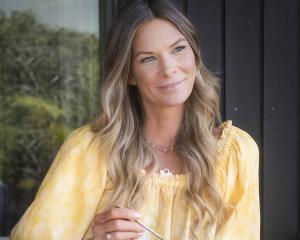"We know the problem and the cause of obesity - children make poor food choices. We know what they should eat, but why don't they get excited by fresh, unadorned fruit and vegetables?" asks Stephanie Alexander.
It's not finger-wagging that's needed but getting children excited by fresh fruit and vegetables, she believes.
The Australian chef, cookbook writer and former restaurateur believes children, and no doubt adults as well, are influenced by advertising and supermarkets and don't notice or care that food has no texture or flavour when it's been wrapped or processed and has been sitting on shelves for too long.
She and her Kitchen Garden Foundation team are leading a quiet kitchen garden revolution, fostering enthusiasm and skills for gardening and cooking among primary school children.
She was at Savour New Zealand in Auckland recently, talking about her kitchen garden project that started in Melbourne and is moving through Australian schools.
With her ability to inspire people - one only has to read her Cook's Companion to see her enthusiasm - she has launched a project to encourage and make possible kitchen gardens in primary schools in her home state of Victoria.
She started with a belief, ignored all the naysayers, and just did it, establishing her Kitchen Garden Foundation, a charitable trust, to advise and offer practical help, including working with sponsors and suppliers.
The most important thing was to set up a pilot programme so people could see how it worked and appreciate the outcomes, she said.
In Melbourne she started with Collingwood School, which had some spare land, a commitment to community involvement and, most importantly, a principal who believed in the educational relevance and value of the programme.
The principal is Italian, and that was also relevant to her attitude to eating, Alexander says.
In her book Kitchen Garden Cooking with Kids she tells the story of the Collingwood project and gives many recipes with simple but detailed instructions that are used in the classrooms, and lists the outcomes and skills the children have learned.
Schools apply for a two-year state government grant to help set up an edible garden and a teaching kitchen and pay two part-time specialists.
Children aged from about 8 to 11 spend three-quarters of an hour a week working in the garden making compost, planting, tending and harvesting, and an hour and a-half in the kitchen, preparing, cooking and eating.
They work in small groups with volunteers and the kitchen or garden specialist and class teacher who oversee the work.
They learn not only gardening and cooking skills but also socialising skills as well as language to describe tastes and flavours.
The sessions become an important part of the curriculum, linking with further learning opportunities such as calculating the amount of water needed to irrigate the garden, learning about oxidation, weighing and measuring.
Once the two-year funding is over, the project has to be self-sustaining, the major costs being the two part-time specialists.
Some principals and committees are creative about that, Alexander says.
"There's not a single principal who says we're going to stop the project at the end of two years. They've all had sufficient exposure to it to say it's very valuable and they want to keep going."
From the pilot project in a single school, 6000 Victorian children now have a gardening and food programme every week. With federal support that number is expected to rise to 30,000 by 2012, as the programme expands into other states.
However, that is only about 250 to 300 schools and, altogether, there are 7000 Australian primary schools, she explains.
"We had four different professional development days for the kitchen specialists so we could talk about what was happening and share problems.
"The general mood at those days was wonderfully encouraging because all we could get was positive stories from the gardeners and cooks.
"They all had their little wails about funding, but essentially they were saying the children love it, the school increasingly understands what it's about, the classroom teachers are able to use it, and we love it and want to continue doing it."
At the Savour New Zealand symposium, Lynn Campbell of the Families Commission and Green Party MP Sue Kedgley expressed their support and a wish to do something similar in New Zealand.
Stephanie Alexander acknowledges it is a big project, but when she becomes overwhelmed, she remembers that once upon a time primary schools didn't have libraries either.
"I'm hoping the kitchen and garden will fall into the category all schools will have," she said.












